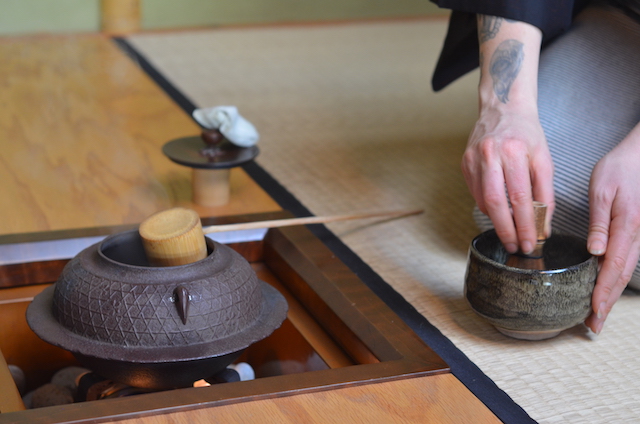
Recently, I visited
Blue Willow Teaspot in West Berkeley, a new tea cafe that has a tiny Japanese tearoom tucked in the back, where visitors can experience
chado, or the ceremonial preparation of matcha.
Blue Willow Teaspot opened in October 2016. Originally, Blue Willow was solely a wholesale business. Its current owner, Ali Roth was an employee at the company under previous owner, Lynn Mallard. In 2012, when Mallard retired, Ali bought the business. Last year, she decided to open the cafe to meet and make tea for the people who were buying her products. The Teaspot, located on 10th Street between Gilman and Harrison, is in the former office of her wholesale business.
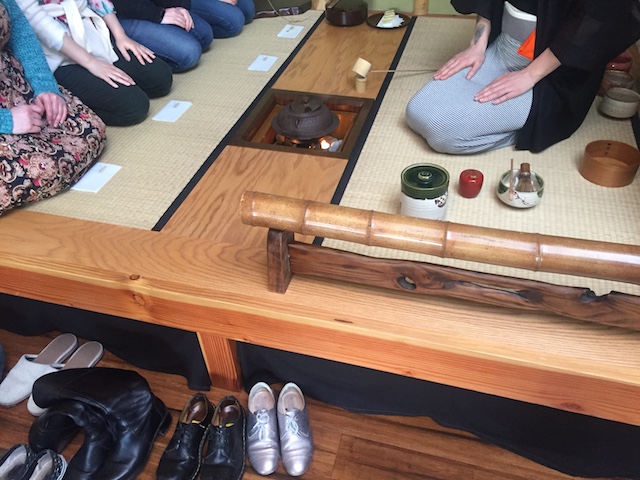
Tea ceremony demonstrations occur at Blue Willow Teaspot on Saturdays and Sundays at 2 p.m. and cost $10 a person. I got to Blue Willow on a Sunday at 1:30 p.m. to meet Ali and settle in before the demo. By that time, four people had already signed up for the day's tea ceremony – the maximum number of guests who can fit into the tearoom. If you plan on going for a tea ceremony, I advise calling in advance to make sure there's space for you.

Ali was getting ready for the day's ceremony when I got there. Here she is preparing the matcha. She uses Shohaku, an
usucha matcha (thin-style) sourced from Uji, Japan.

She also prepared
wagashi (Japanese sweets) for guests to enjoy with their matcha.

While she continued to prep, Ali explained she's been interested in tea since she was 11-years-old, after her first visit to Japan, where she experienced a tea ceremony. But it wasn't until she started working at Blue Willow did she find herself deeply steeped in the world of tea. Blue Willow specializes in single-origin teas, sourced from all over the world, including Japan, Taiwan, India, and Malaysia, and Ali regularly travels to the farms that source her teas.
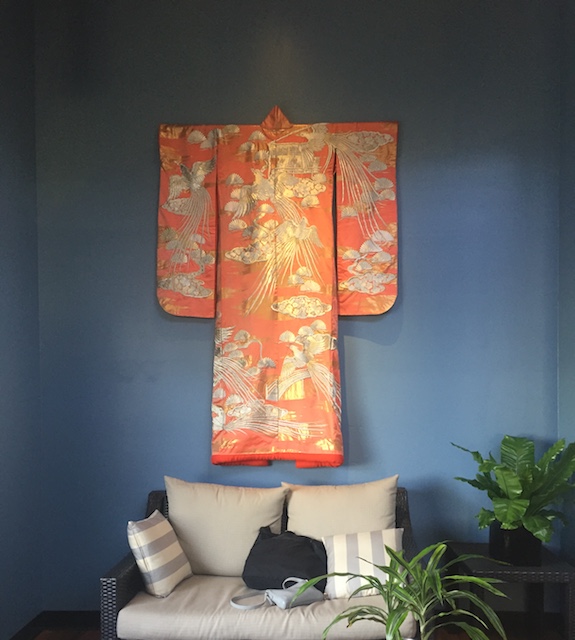
Ali's first Japanese tea ceremony made a lasting impression. She studied the art of chado under Shun Yang, her sensei for the last five years. Yang once owned Itsy Bitsy Tea Room on College Avenue and had the
cha-sitsu (tearoom) built in 2010 to teach students the art of chado. In fact, Ali learned from Yang within this very tearoom, and bought it from her sensei to install in Blue Willow.
All ceremonial tearooms are furnished with tatami mats, a fire pit, a hanging scroll (
kakejiku), a display of flowers (
chabana).

Two tatami mats cover the floors of Ali's tiny cha-sitsu. The one on the right is where the
teishu (host
) sits and prepares the tea. Here's Ali lighting the firepit, which will keep the water hot for the ceremony. Traditionally, charcoal is used for fuel, but Ali uses sterno cannisters.

Shoes are left on the floor, at the foot of the raised room. The stone placed here is a marker, to represent the point where you step from one world into another. Ali explained that in Japan, the tea room is a neutral space, a level-playing field where even enemies could safely sip tea together.
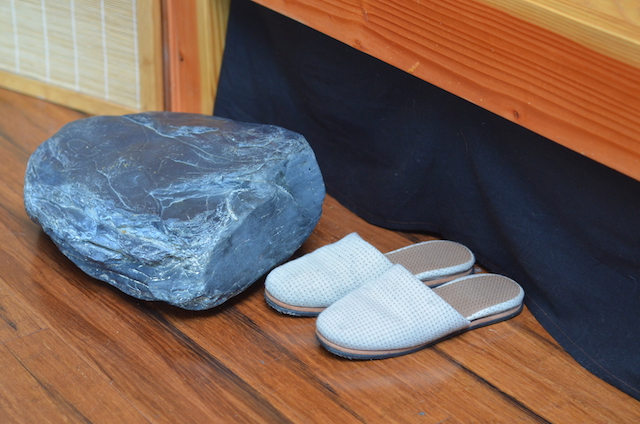
I got to see the back room of the cha-sitsu, where Ali keeps the prepared items ready for the ceremony on a small shelf. This back area leads to a sliding door that only the host uses for entering and exiting the tearoom.
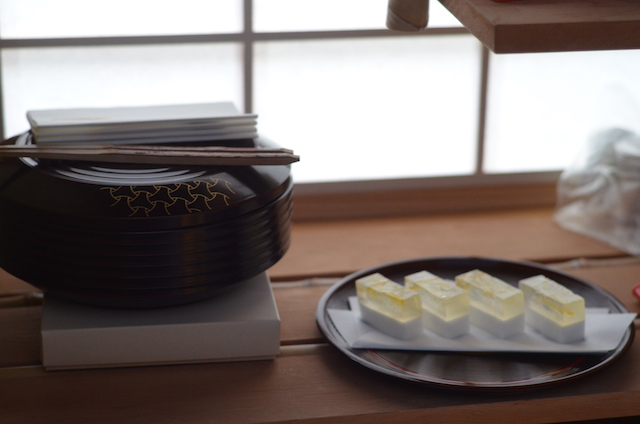
And finally it was 2 p.m. – showtime!
The four guests were invited to line up and one-by-one, take off their shoes and enter the cha-sitsu. Guests traditionally sit
seiza-style (kneeling with legs folded underneath you, butt on your heels) on the tatami mat. Ali realizes that most of us aren't used to this position, so she's fine if you need to adjust your seating.
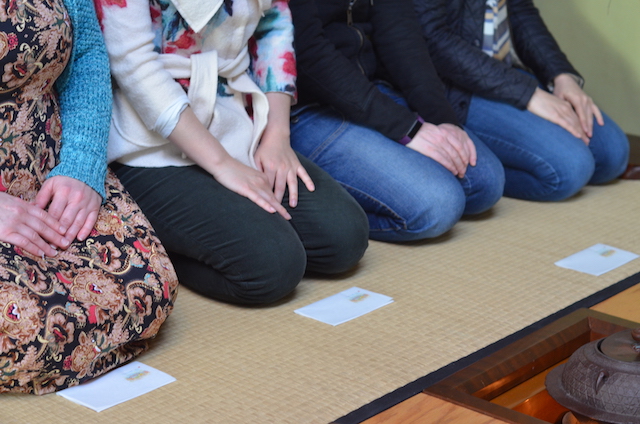
After Ali and the guests bowed to each other, the wagashi were passed. Guests placed them onto the folded
Kaishi papers in front of them.
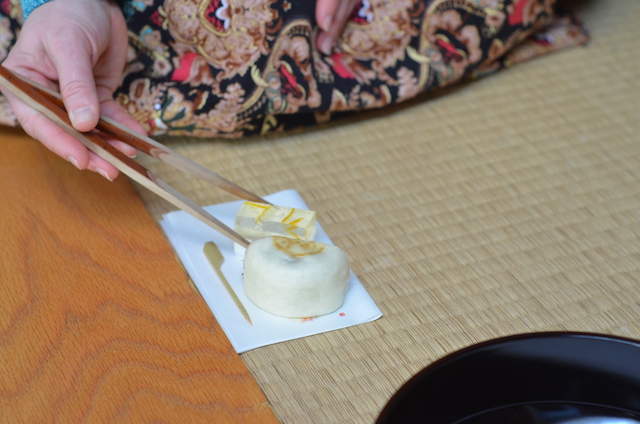
Ali began preparing the matcha by cleaning the utensils with an orange cloth called a
fukusa. This step is purely ceremonial, as the utensils are already clean. The fukusa is kept in her kimono, and there's a specific method of using, and then refolding, this cloth.
The tools and wares that are used are the
chasen (bamboo whisk),
chashaku (bamboo matcha scoop)
cha-ire (container that holds the tea),
kama (kettle),
hishaku (bamboo ladle),
kensui (waste water bowl), and
chawan (tea bowls).
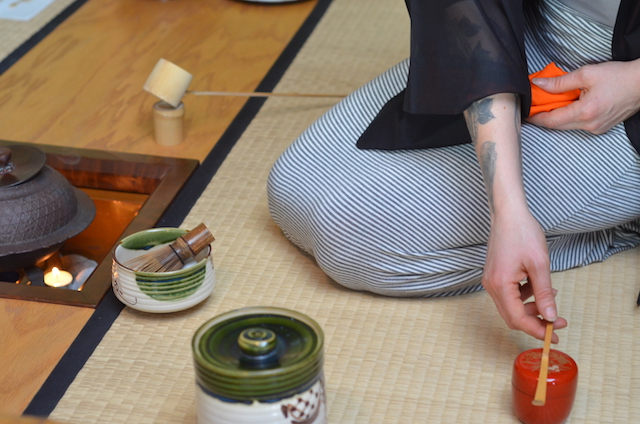
There are many different types of tea ceremonies. At Blue Willow, guests will experience
Omotesenke, one of the more traditional styles.
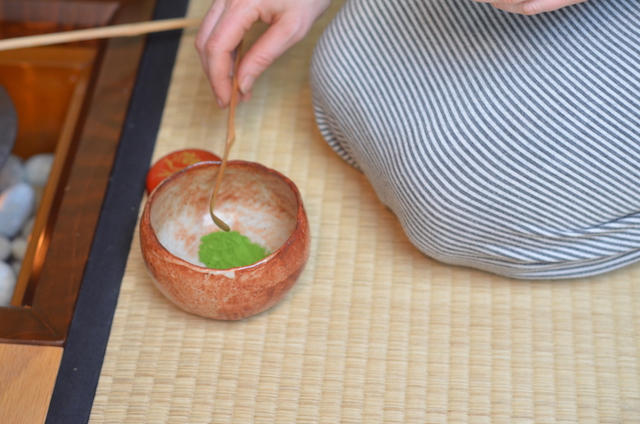
In this type of ceremony, the matcha is whisked less, so it does not have a thick foam on top, rather a small pond floating atop the emerald-hued tea.
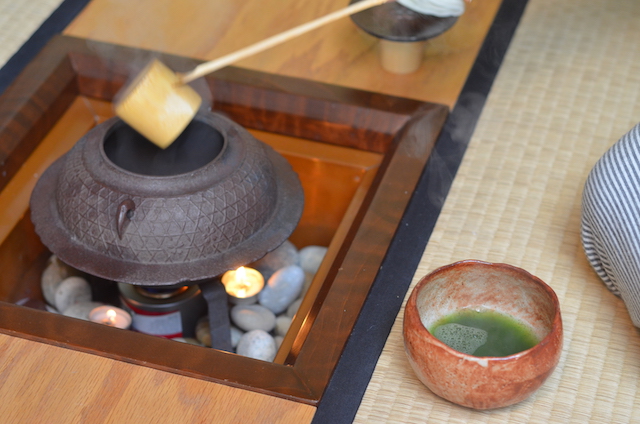
One at a time, Ali prepared a bowl of matcha for each guest.
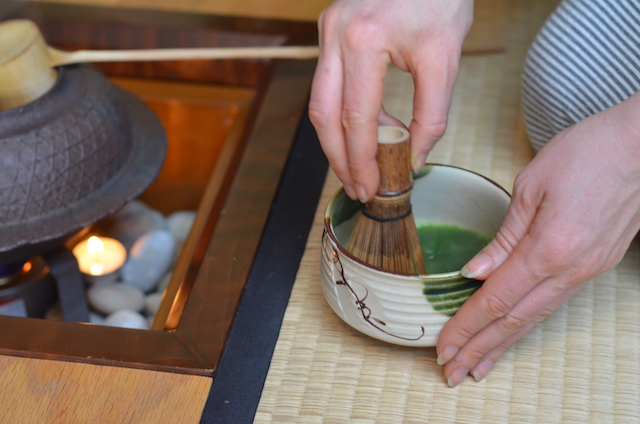
For service, there are very specific movements and rules: First, the right hand always picks up the chawan, then places it on the left palm. The chawan is then turned two times slightly so that the front side of the bowl is facing the guest and the right hand places it down in front of them.
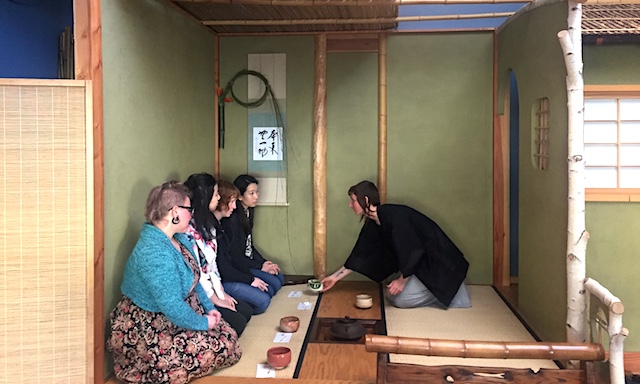
Guests, in turn, also pick up and sip the tea with specific steps. Ali guided the guests through each movement.
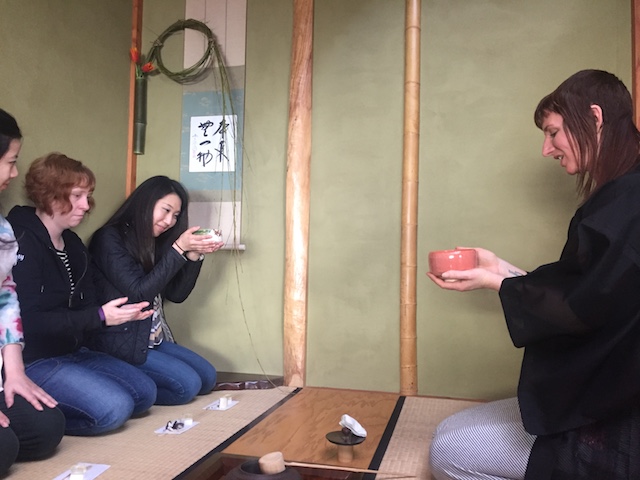
A tidbit I found interesting is that guests are supposed to turn the chawan, also in two small turns, so that they drink from the back of the tea bowl. This is a sign of respect for the bowl maker. Guests are also expected to loudly slurp down the last sip.
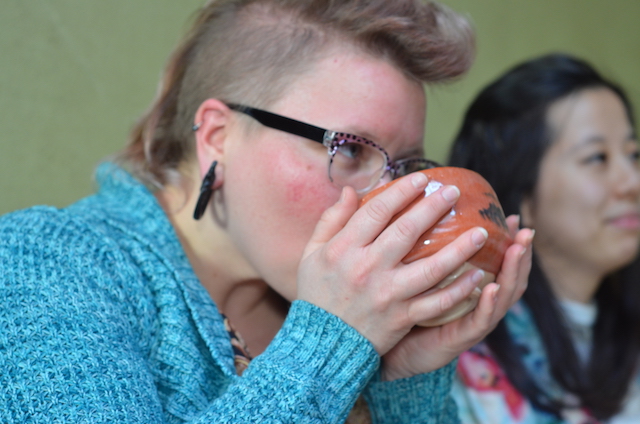
One thing to note: Don't expect this to be a stuffy, super traditional tea ceremony. In fact, if she were to follow the traditional rules and regulations, Ali's tattoos would be a no-no. When she visits other tearooms, she makes sure her tattoos are completely covered. Jewelry and nail polish are also frowned upon. Most tea ceremonies are very quiet affairs, but at Blue Willow, guests are free to chat and whatever's playing in the cafe music provides the tea ceremony soundtrack.
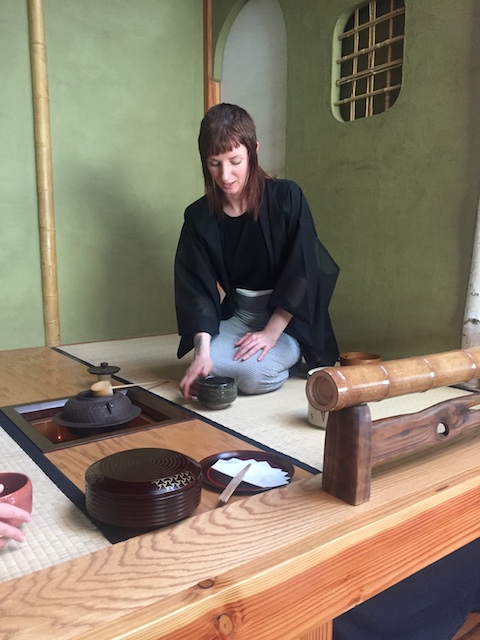
For further learning on the art of chado, Ali suggests
No Gate Tea, a non-profit organization in Berkeley that teaches tea ceremony workshops.
Before you leave, be sure to check out and taste Blue Willow's other tea offerings and browse their tea wares, many of which are made locally.

And, mark you calendar for February 18, when Blue Willow hosts
Beyond Plunder, an event with Japanese filmmaker/activist/organic farmer, Masanori Oe, who will be showing several short films of 1960s protests, and speak about activism today.
Blue Willow Teaspot
1200 10th St.
Berkeley, CA 94710
510.524.1933
 Recently, I visited Blue Willow Teaspot in West Berkeley, a new tea cafe that has a tiny Japanese tearoom tucked in the back, where visitors can experience chado, or the ceremonial preparation of matcha.
Blue Willow Teaspot opened in October 2016. Originally, Blue Willow was solely a wholesale business. Its current owner, Ali Roth was an employee at the company under previous owner, Lynn Mallard. In 2012, when Mallard retired, Ali bought the business. Last year, she decided to open the cafe to meet and make tea for the people who were buying her products. The Teaspot, located on 10th Street between Gilman and Harrison, is in the former office of her wholesale business.
Recently, I visited Blue Willow Teaspot in West Berkeley, a new tea cafe that has a tiny Japanese tearoom tucked in the back, where visitors can experience chado, or the ceremonial preparation of matcha.
Blue Willow Teaspot opened in October 2016. Originally, Blue Willow was solely a wholesale business. Its current owner, Ali Roth was an employee at the company under previous owner, Lynn Mallard. In 2012, when Mallard retired, Ali bought the business. Last year, she decided to open the cafe to meet and make tea for the people who were buying her products. The Teaspot, located on 10th Street between Gilman and Harrison, is in the former office of her wholesale business.
 Tea ceremony demonstrations occur at Blue Willow Teaspot on Saturdays and Sundays at 2 p.m. and cost $10 a person. I got to Blue Willow on a Sunday at 1:30 p.m. to meet Ali and settle in before the demo. By that time, four people had already signed up for the day's tea ceremony – the maximum number of guests who can fit into the tearoom. If you plan on going for a tea ceremony, I advise calling in advance to make sure there's space for you.
Tea ceremony demonstrations occur at Blue Willow Teaspot on Saturdays and Sundays at 2 p.m. and cost $10 a person. I got to Blue Willow on a Sunday at 1:30 p.m. to meet Ali and settle in before the demo. By that time, four people had already signed up for the day's tea ceremony – the maximum number of guests who can fit into the tearoom. If you plan on going for a tea ceremony, I advise calling in advance to make sure there's space for you.
 Ali was getting ready for the day's ceremony when I got there. Here she is preparing the matcha. She uses Shohaku, an usucha matcha (thin-style) sourced from Uji, Japan.
Ali was getting ready for the day's ceremony when I got there. Here she is preparing the matcha. She uses Shohaku, an usucha matcha (thin-style) sourced from Uji, Japan.
 She also prepared wagashi (Japanese sweets) for guests to enjoy with their matcha.
She also prepared wagashi (Japanese sweets) for guests to enjoy with their matcha.
 While she continued to prep, Ali explained she's been interested in tea since she was 11-years-old, after her first visit to Japan, where she experienced a tea ceremony. But it wasn't until she started working at Blue Willow did she find herself deeply steeped in the world of tea. Blue Willow specializes in single-origin teas, sourced from all over the world, including Japan, Taiwan, India, and Malaysia, and Ali regularly travels to the farms that source her teas.
While she continued to prep, Ali explained she's been interested in tea since she was 11-years-old, after her first visit to Japan, where she experienced a tea ceremony. But it wasn't until she started working at Blue Willow did she find herself deeply steeped in the world of tea. Blue Willow specializes in single-origin teas, sourced from all over the world, including Japan, Taiwan, India, and Malaysia, and Ali regularly travels to the farms that source her teas.
 Ali's first Japanese tea ceremony made a lasting impression. She studied the art of chado under Shun Yang, her sensei for the last five years. Yang once owned Itsy Bitsy Tea Room on College Avenue and had the cha-sitsu (tearoom) built in 2010 to teach students the art of chado. In fact, Ali learned from Yang within this very tearoom, and bought it from her sensei to install in Blue Willow.
All ceremonial tearooms are furnished with tatami mats, a fire pit, a hanging scroll (kakejiku), a display of flowers (chabana).
Ali's first Japanese tea ceremony made a lasting impression. She studied the art of chado under Shun Yang, her sensei for the last five years. Yang once owned Itsy Bitsy Tea Room on College Avenue and had the cha-sitsu (tearoom) built in 2010 to teach students the art of chado. In fact, Ali learned from Yang within this very tearoom, and bought it from her sensei to install in Blue Willow.
All ceremonial tearooms are furnished with tatami mats, a fire pit, a hanging scroll (kakejiku), a display of flowers (chabana).
 Two tatami mats cover the floors of Ali's tiny cha-sitsu. The one on the right is where the teishu (host) sits and prepares the tea. Here's Ali lighting the firepit, which will keep the water hot for the ceremony. Traditionally, charcoal is used for fuel, but Ali uses sterno cannisters.
Two tatami mats cover the floors of Ali's tiny cha-sitsu. The one on the right is where the teishu (host) sits and prepares the tea. Here's Ali lighting the firepit, which will keep the water hot for the ceremony. Traditionally, charcoal is used for fuel, but Ali uses sterno cannisters.
 Shoes are left on the floor, at the foot of the raised room. The stone placed here is a marker, to represent the point where you step from one world into another. Ali explained that in Japan, the tea room is a neutral space, a level-playing field where even enemies could safely sip tea together.
Shoes are left on the floor, at the foot of the raised room. The stone placed here is a marker, to represent the point where you step from one world into another. Ali explained that in Japan, the tea room is a neutral space, a level-playing field where even enemies could safely sip tea together.
 I got to see the back room of the cha-sitsu, where Ali keeps the prepared items ready for the ceremony on a small shelf. This back area leads to a sliding door that only the host uses for entering and exiting the tearoom.
I got to see the back room of the cha-sitsu, where Ali keeps the prepared items ready for the ceremony on a small shelf. This back area leads to a sliding door that only the host uses for entering and exiting the tearoom.
 And finally it was 2 p.m. – showtime!
The four guests were invited to line up and one-by-one, take off their shoes and enter the cha-sitsu. Guests traditionally sit seiza-style (kneeling with legs folded underneath you, butt on your heels) on the tatami mat. Ali realizes that most of us aren't used to this position, so she's fine if you need to adjust your seating.
And finally it was 2 p.m. – showtime!
The four guests were invited to line up and one-by-one, take off their shoes and enter the cha-sitsu. Guests traditionally sit seiza-style (kneeling with legs folded underneath you, butt on your heels) on the tatami mat. Ali realizes that most of us aren't used to this position, so she's fine if you need to adjust your seating.
 After Ali and the guests bowed to each other, the wagashi were passed. Guests placed them onto the folded Kaishi papers in front of them.
After Ali and the guests bowed to each other, the wagashi were passed. Guests placed them onto the folded Kaishi papers in front of them.
 Ali began preparing the matcha by cleaning the utensils with an orange cloth called a fukusa. This step is purely ceremonial, as the utensils are already clean. The fukusa is kept in her kimono, and there's a specific method of using, and then refolding, this cloth.
The tools and wares that are used are the chasen (bamboo whisk), chashaku (bamboo matcha scoop) cha-ire (container that holds the tea), kama (kettle), hishaku (bamboo ladle), kensui (waste water bowl), and chawan (tea bowls).
Ali began preparing the matcha by cleaning the utensils with an orange cloth called a fukusa. This step is purely ceremonial, as the utensils are already clean. The fukusa is kept in her kimono, and there's a specific method of using, and then refolding, this cloth.
The tools and wares that are used are the chasen (bamboo whisk), chashaku (bamboo matcha scoop) cha-ire (container that holds the tea), kama (kettle), hishaku (bamboo ladle), kensui (waste water bowl), and chawan (tea bowls).
 There are many different types of tea ceremonies. At Blue Willow, guests will experience Omotesenke, one of the more traditional styles.
There are many different types of tea ceremonies. At Blue Willow, guests will experience Omotesenke, one of the more traditional styles.
 In this type of ceremony, the matcha is whisked less, so it does not have a thick foam on top, rather a small pond floating atop the emerald-hued tea.
In this type of ceremony, the matcha is whisked less, so it does not have a thick foam on top, rather a small pond floating atop the emerald-hued tea.
 One at a time, Ali prepared a bowl of matcha for each guest.
One at a time, Ali prepared a bowl of matcha for each guest.
 For service, there are very specific movements and rules: First, the right hand always picks up the chawan, then places it on the left palm. The chawan is then turned two times slightly so that the front side of the bowl is facing the guest and the right hand places it down in front of them.
For service, there are very specific movements and rules: First, the right hand always picks up the chawan, then places it on the left palm. The chawan is then turned two times slightly so that the front side of the bowl is facing the guest and the right hand places it down in front of them.
 Guests, in turn, also pick up and sip the tea with specific steps. Ali guided the guests through each movement.
Guests, in turn, also pick up and sip the tea with specific steps. Ali guided the guests through each movement.
 A tidbit I found interesting is that guests are supposed to turn the chawan, also in two small turns, so that they drink from the back of the tea bowl. This is a sign of respect for the bowl maker. Guests are also expected to loudly slurp down the last sip.
A tidbit I found interesting is that guests are supposed to turn the chawan, also in two small turns, so that they drink from the back of the tea bowl. This is a sign of respect for the bowl maker. Guests are also expected to loudly slurp down the last sip.
 One thing to note: Don't expect this to be a stuffy, super traditional tea ceremony. In fact, if she were to follow the traditional rules and regulations, Ali's tattoos would be a no-no. When she visits other tearooms, she makes sure her tattoos are completely covered. Jewelry and nail polish are also frowned upon. Most tea ceremonies are very quiet affairs, but at Blue Willow, guests are free to chat and whatever's playing in the cafe music provides the tea ceremony soundtrack.
One thing to note: Don't expect this to be a stuffy, super traditional tea ceremony. In fact, if she were to follow the traditional rules and regulations, Ali's tattoos would be a no-no. When she visits other tearooms, she makes sure her tattoos are completely covered. Jewelry and nail polish are also frowned upon. Most tea ceremonies are very quiet affairs, but at Blue Willow, guests are free to chat and whatever's playing in the cafe music provides the tea ceremony soundtrack.
 For further learning on the art of chado, Ali suggests No Gate Tea, a non-profit organization in Berkeley that teaches tea ceremony workshops.
Before you leave, be sure to check out and taste Blue Willow's other tea offerings and browse their tea wares, many of which are made locally.
For further learning on the art of chado, Ali suggests No Gate Tea, a non-profit organization in Berkeley that teaches tea ceremony workshops.
Before you leave, be sure to check out and taste Blue Willow's other tea offerings and browse their tea wares, many of which are made locally.
 And, mark you calendar for February 18, when Blue Willow hosts Beyond Plunder, an event with Japanese filmmaker/activist/organic farmer, Masanori Oe, who will be showing several short films of 1960s protests, and speak about activism today.
Blue Willow Teaspot
1200 10th St.
Berkeley, CA 94710
510.524.1933
And, mark you calendar for February 18, when Blue Willow hosts Beyond Plunder, an event with Japanese filmmaker/activist/organic farmer, Masanori Oe, who will be showing several short films of 1960s protests, and speak about activism today.
Blue Willow Teaspot
1200 10th St.
Berkeley, CA 94710
510.524.1933

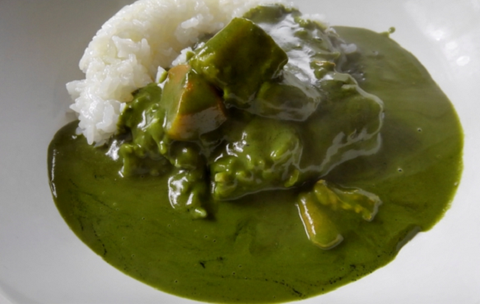

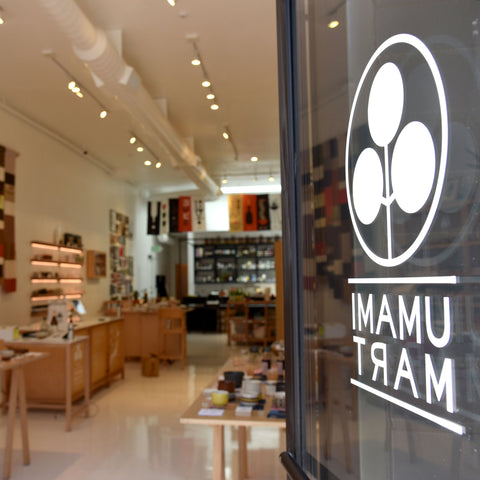
Comments (0)
There are no comments for this article. Be the first one to leave a message!